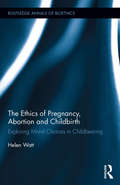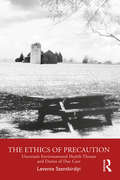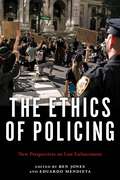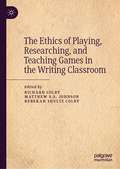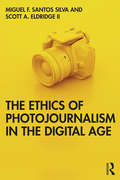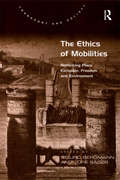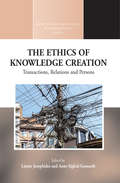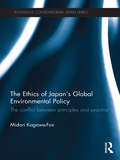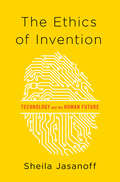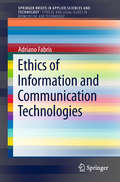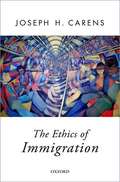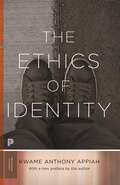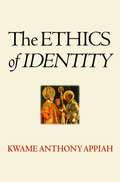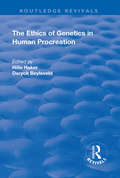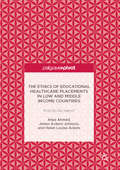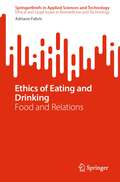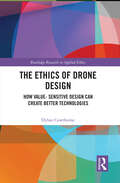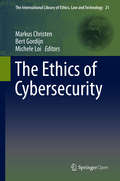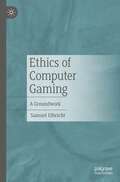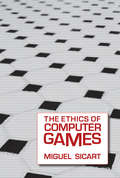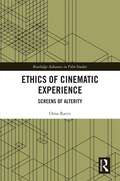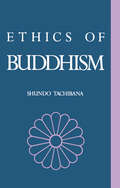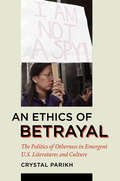- Table View
- List View
The Ethics of Pregnancy, Abortion and Childbirth: Exploring Moral Choices in Childbearing (Routledge Annals of Bioethics)
by Helen WattThe Ethics of Pregnancy, Abortion and Childbirth addresses the unique moral questions raised by pregnancy and its intimate bodily nature. From assisted reproduction to abortion and ‘vital conflict’ resolution to more everyday concerns of the pregnant woman, this book argues for pregnancy as a close human relationship with the woman as guardian or custodian. Four approaches to pregnancy are explored: ‘uni-personal’, ‘neighborly’, ‘maternal’ and ‘spousal’. The author challenges not only the view that there is only one moral subject to consider in pregnancy, but also the idea that the location of the fetus lacks all inherent, unique significance. It is argued that the pregnant woman is not a mere ‘neighbor’ or helpful stranger to the fetus but is rather already in a real familial relationship bringing real familial rights and obligations. If the status of the fetus is conclusive for at least some moral questions raised by pregnancy, so too are facts about its bodily relationship with, and presence in, the woman who supports it. This lucid, accessible and original book explores fundamental ethical issues in a rich and often neglected area of philosophy in ways of interest also to those from other disciplines.
The Ethics of Precaution: Uncertain Environmental Health Threats and Duties of Due Care
by Levente SzentkirályiThere are thousands of substances manufactured in the United States to which the public is routinely exposed and for which toxicity data are limited or absent. Some insist that uncertainty about the severity of potential harm justifies implementing precautionary regulations, while others claim that uncertainty justifies the absence of regulations until sufficient evidence confirms a strong probability of severe harm. In this book, Levente Szentkirályi overcomes this impasse in his defense of precautionary environmental risk regulation by shifting the focus from how to manage uncertainty to what it is we owe each other morally. He argues that actions that create uncertain threats wrongfully gamble with the welfare of those who are exposed and neglect the reciprocity that our equal moral standing demands. If we take the moral equality and rights of others seriously, we have a duty to exercise due care to strive to prevent putting them in possible harm’s way. The Ethics of Precaution will be of great interest to researchers, educators, advanced students, and practitioners working in the fields of environmental political theory, ethics of risk, and environmental policy.
The Ethics of Policing: New Perspectives on Law Enforcement
by Edited by Ben Jones and Eduardo MendietaTop scholars provide a critical analysis of the current ethical challenges facing police officers, police departments, and the criminal justice systemFrom George Floyd to Breonna Taylor, the brutal deaths of Black citizens at the hands of law enforcement have brought race and policing to the forefront of national debate in the United States. In The Ethics of Policing, Ben Jones and Eduardo Mendieta bring together an interdisciplinary group of scholars across the social sciences and humanities to reevaluate the role of the police and the ethical principles that guide their work.With contributors such as Tracey Meares, Michael Walzer, and Franklin Zimring, this volume covers timely topics including race and policing, the use of aggressive tactics and deadly force, police abolitionism, and the use of new technologies like drones, body cameras, and predictive analytics, providing different perspectives on the past, present, and future of policing, with particular attention to discriminatory practices that have historically targeted Black and Brown communities. This volume offers cutting-edge insight into the ethical challenges facing the police and the institutions that oversee them. As high-profile cases of police brutality spark protests around the country, The Ethics of Policing raises questions about the proper role of law enforcement in a democratic society.
The Ethics of Playing, Researching, and Teaching Games in the Writing Classroom
by Richard Colby Matthew S.S. Johnson Rebekah Shultz ColbyThis book explores ethos and games while analyzing the ethical dimensions of playing, researching, and teaching games. Contributors, primarily from rhetoric and writing studies, connect instances of ethos and ethical practice with writing pedagogy, game studies, video games, gaming communities, gameworlds, and the gaming industry. The collection’s eighteen chapters investigate game-based writing classrooms, gamification, game design, player agency, and writing and gaming scholarship in order to illuminate how ethos is reputed, interpreted, and remembered in virtual gamespaces and in the gaming industry. Ethos is constructed, invented, and created in and for games, but inevitably spills out into other domains, affecting agency, ideology, and the cultures that surround game developers, players, and scholars.
The Ethics of Photojournalism in the Digital Age
by Miguel Franquet Santos Silva Scott A. Eldridge IIDelving into the complexities of contemporary reportage, this book draws from moral philosophy and histories of photojournalism to understand the emergence of this distinct practice and discuss its evolution in a digital era. In arguing that the digitization of photography obliges us to radically challenge some of the traditional conceptions of press photography, this book addresses the historic opposition between artistic and journalistic photographs, showing and challenging how this has subtly inspired support for a forensic approach to photojournalism ethics. The book situates this debate within questions of relativism over what is ‘moral’, and normative debates over what is ‘journalistic’, alongside technical debates as to what is ‘possible’, to underpin a discussion of photojournalism as an ethical, moral, and societally important journalistic practice. Including detailed comparative analyses of codes of ethics, examination of controversial cases, and a study of photojournalism ethics as applied in different newsrooms, the book examines how ethical principles are applied by the global news media and explores the potential for constructive dialogue between different voices interested in pursuing the best version of photojournalism. A targeted, comprehensive and engaging book, this is a valuable resource for academics, researchers and students of photojournalism, as well as philosophy, communications and media studies more broadly.
The Ethics of Mobilities: Rethinking Place, Exclusion, Freedom and Environment (Transport and Society)
by Tore SagerWith this book the international academic discourse on mobility is taken a step further, through the intertwined perspectives of different social sciences, engineering and the humanities. The Ethics of Mobilities departs from the recent interest in social surveillance, raised by the use of technology for the surveillance and control of mobility as well as for transport. It widens this theme to encompass a broad scale of issues, ranging from freedom and escape to social exclusion and control, thus raising important questions of ethics, identity and religion; questions that are dealt with by a diverse, yet structured range of chapters, arranged around the themes of ethics and religion, and freedom and control. Through their variety and diversity of perspectives, the chapters of this book offer a substantial interdisciplinary contribution to the socially and environmentally relevant discussion about what a technically and economically accelerating mobility does to life and how it might be transformed to sustain a more life-enhancing future. Ethics of Mobilities will excite not only international interest, but will also appeal to scholars across a wide range of disciplines, in fields as diverse as theology and engineering.
The Ethics of Knowledge Creation: Transactions, Relations, and Persons (Methodology & History in Anthropology #31)
by Lisette Josephides Anne Sigfrid GrønsethAnthropology lies at the heart of the human sciences, tackling questions having to do with the foundations, ethics, and deployment of the knowledge crucial to human lives. The Ethics of Knowledge Creation focuses on how knowledge is relationally created, how local knowledge can be transmuted into ‘universal knowledge’, and how the transaction and consumption of knowledge also monitors its subsequent production. This volume examines the ethical implications of various kinds of relations that are created in the process of ‘transacting knowledge’ and investigates how these transactions are also situated according to broader contradictions or synergies between ethical, epistemological, and political concerns.
The Ethics of Japan's Global Environmental Policy: The conflict between principles and practice (Routledge Contemporary Japan Series)
by Midori Kagawa-FoxThis book examines the Japanese government policies that impact on the environment in order to determine whether they incorporate a sufficient ethical substance. Through the three case studies on whaling, nuclear energy, and forestry, the author explores how Western philosophers combined their theories to develop a ‘Western environmental ethics code’ and reveals the existence of a unique ‘Japanese environmental ethics code’ built on Japan’s cultural traditions, religious practices, and empirical experiences. Kagawa-Fox’s discussions show that in spite of the positive contributions that Japan has made towards the global environment, the government has failed to show a corresponding moral obligation to the world ecology in its environmental policy. The book argues that this is a result of the integrity of the policies having been compromised by vested interests and that Japanese business and politics ensure that the policies are primarily focused on maintaining sustainable economic growth. Whilst Japan's global environmental initiatives are the key to its economic survival in the 21st century, and these initiatives may achieve their aims, they do however fail the Japanese code of environmental ethics. This book is essential reading for anyone interested in Environmental Studies, Environmental Policy and Ethics, Japanese Politics and Japanese Culture and Society.
The Ethics of Invention: Technology and the Human Future
by Sheila JasanoffWe live in a world increasingly governed by technology--but to what end? Technology rules us as much as laws do. It shapes the legal, social, and ethical environments in which we act. Every time we cross a street, drive a car, or go to the doctor, we submit to the silent power of technology. Yet, much of the time, the influence of technology on our lives goes unchallenged by citizens and our elected representatives. In The Ethics of Invention, renowned scholar Sheila Jasanoff dissects the ways in which we delegate power to technological systems and asks how we might regain control. Our embrace of novel technological pathways, Jasanoff shows, leads to a complex interplay among technology, ethics, and human rights. Inventions like pesticides or GMOs can reduce hunger but can also cause unexpected harm to people and the environment. Often, as in the case of CFCs creating a hole in the ozone layer, it takes decades before we even realize that any damage has been done. Advances in biotechnology, from GMOs to gene editing, have given us tools to tinker with life itself, leading some to worry that human dignity and even human nature are under threat. But despite many reasons for caution, we continue to march heedlessly into ethically troubled waters. As Jasanoff ranges across these and other themes, she challenges the common assumption that technology is an apolitical and amoral force. Technology, she masterfully demonstrates, can warp the meaning of democracy and citizenship unless we carefully consider how to direct its power rather than let ourselves be shaped by it. The Ethics of Invention makes a bold argument for a future in which societies work together--in open, democratic dialogue--to debate not only the perils but even more the promises of technology.
Ethics of Information and Communication Technologies (SpringerBriefs in Applied Sciences and Technology)
by Adriano FabrisThis book discusses key ethical and deontological problems concerning the use of the most common information and communication devices. It focuses on the challenges of the new environments we now find ourselves in thanks to these technologies, and the issues arising from the newly established relationship between the virtual sphere and the real world. Each aspect is analysed by starting from a very specific example or a case study presenting a dilemma that can only be resolved by making a reasoned ethical choice. Rather than thematically addressing only one of the many aspects mentioned above (for example, computer ethics or social network ethics), the book presents a comprehensive introduction to, and a co-ordinated overview of, the various deontological and ethical issues regarding the spread of the most common information and communication technologies.
The Ethics of Immigration
by Joseph CarensCarens begins by focusing on current immigration controversies in North America and Europe about access to citizenship, the integration of immigrants, temporary workers, irregular migrants and the admission of family members and refugees. Working within the moral framework provided by liberal democratic values, he argues that some of the practices of democratic states in these areas are morally defensible, while others need to be reformed. In the last part of the book he moves beyond the currently feasible to ask questions about immigration from a more fundamental perspective. He argues that democratic values of freedom and equality ultimately entail a commitment to open borders. Only in a world of open borders, he contends, will we live up to our most basic principles. Many will not agree with some of Carens' claims, especially his controversial conclusion, but none will be able to dismiss his views lightly. Powerfully argued by one of the world's leading political philosophers on the issue, The Ethics of Immigration is a landmark work on one of the most important global social trends of our era.
The Ethics of Identity (Princeton Classics #132)
by Kwame Anthony AppiahA bold vision of liberal humanism for navigating today’s complex world of growing identity politics and rising nationalismCollective identities such as race, nationality, religion, gender, and sexuality clamor for recognition and respect, sometimes at the expense of other things we value. To what extent do they constrain our freedom, and to what extent do they enable our individuality? Is diversity of value in itself? Has the rhetoric of human rights been overstretched? Kwame Anthony Appiah draws on thinkers through the ages and across the globe to explore such questions, developing an account of ethics that connects moral obligations with collective allegiances and that takes aim at clichés and received ideas about identity. This classic book takes seriously both the claims of individuality—the task of making a life—and the claims of identity, these large and often abstract social categories through which we define ourselves.
The Ethics of Identity (Princeton Classics Ser. #132)
by Kwame Anthony AppiahRace, ethnicity, nationality, religion, gender, sexuality: in the past couple of decades, a great deal of attention has been paid to such collective identities. They clamor for recognition and respect, sometimes at the expense of other things we value. But to what extent do "identities" constrain our freedom, our ability to make an individual life, and to what extent do they enable our individuality? In this beautifully written work, renowned philosopher and African Studies scholar Kwame Anthony Appiah draws on thinkers through the ages and across the globe to explore such questions.The Ethics of Identity takes seriously both the claims of individuality—the task of making a life—and the claims of identity, these large and often abstract social categories through which we define ourselves.What sort of life one should lead is a subject that has preoccupied moral and political thinkers from Aristotle to Mill. Here, Appiah develops an account of ethics, in just this venerable sense—but an account that connects moral obligations with collective allegiances, our individuality with our identities. As he observes, the question who we are has always been linked to the question what we are.Adopting a broadly interdisciplinary perspective, Appiah takes aim at the clichés and received ideas amid which talk of identity so often founders. Is "culture" a good? For that matter, does the concept of culture really explain anything? Is diversity of value in itself? Are moral obligations the only kind there are? Has the rhetoric of "human rights" been overstretched? In the end, Appiah's arguments make it harder to think of the world as divided between the West and the Rest; between locals and cosmopolitans; between Us and Them. The result is a new vision of liberal humanism—one that can accommodate the vagaries and variety that make us human.
The Ethics of Genetics in Human Procreation
by Hille Haker Deryck BeyleveldThis title was first published in 2000: This third volume of proceedings of the European Network for Biomedical Ethics focuses on the ethical issues surrounding the debates on reproductive medicine and genetics in human procreation. Central issues include procreation and parenthood, moral protection of the human embryo and foetus, autonomy and recognition, social implications, moral reasoning in applied ethics, legal regulations of assisted procreation, genetic diagnosis and gene therapy. The legal regulation paper evaluates the central laws and guidelines of European countries.
The Ethics of Educational Healthcare Placements in Low and Middle Income Countries: First Do No Harm?
by Helen Louise Ackers James Ackers-Johnson Anya AhmedThis book is open access under a CC BY 4.0 license.This book examines the current state of elective placements of medical undergraduate students in developing countries and their impact on health care education at home. Drawing from a recent case study of volunteer deployment in Uganda, the authors provide an in-depth evaluation of the impacts on the students themselves and the learning outcomes associated with placements in low resource settings, as well as the impacts that these forms of student mobility have on the host settings. In addition to reviewing the existing literature on elective placements, the authors outline a potential model for the future development of ethical elective placements. As the book concurs with an increasing international demand for elective placements, it will be of immediate interest to universities, intermediary organizations, students as consumers, and hosting organisations in low-resource settings.
Ethics of Eating and Drinking: Food and Relations (SpringerBriefs in Applied Sciences and Technology)
by Adriano FabrisThis book presents and discusses some of the problems that are increasingly emerging today in our relationship with food as well as in our style of eating and drinking. The first three chapters focuses on issues concerning eating, and on our relationship with what we can eat. The fourth chapter deals with the act of drinking, with our relationship with water, and discusses justice aspects in the use of water. The main idea is that the acts of eating and drinking are to be understood as relationships, i.e. as a way human beings relate to other beings. As such, they can be performed ethically well or badly. Therefore, an ethics of eating and of drinking should be developed. Not only the book highlights some key ethical problems associated with the act of eating and drinking, yet it also describes some ethically sustainable solutions to them. It ends with a list of reflections, which are intended to guide our choices in the relations with food and drinks with a normative approach. Mainly written for university students and researchers in the field of applied ethics, this book will also offer an inspiring reading to a wider audience of academics and professionals.
The Ethics of Drone Design: How Value-Sensitive Design Can Create Better Technologies (Routledge Research in Applied Ethics)
by Dylan CawthorneThis book presents a holistic approach to the design and use of drones. It argues that this powerful technology requires high levels of ethical analysis and responsibility – our moral progress must keep pace with our technological progress. Drone technologies support and diminish the flourishing of certain human values, impact power relations between individuals and groups, and add an additional element to the complex network of humans and objects in modern society. The book begins by introducing four prototype drones designed and built by the author: the healthcare drone, the search and rescue drone, the educational drone, and the spiritual drone. These drones have been developed using a value-sensitive design approach – with values such as human welfare, privacy, trust, environmental sustainability, and justice at the forefront. Ethical analyses and social impacts are taken as design inputs, leading to the creation of better, more responsible drone designs. The book then showcases additional methods used to develop the prototype drones from the fields of engineering, ethics, and art, including ethical frameworks, ethics standards, capability caution, and speculative design. The holistic approach reveals a more subtle and nuanced view of drones than the currently polarized characterization of "the good drone" or "the killer drone". The book concludes with recommendations for drone engineers, companies, lawmakers, and citizens on how to support ethics in drone design. The Ethics of Drone Design is an essential resource for scholars, advanced students, engineers, and designers interested in the ethics of technology.
The Ethics of Drone Design: How Value-Sensitive Design Can Create Better Technologies (Routledge Research in Applied Ethics)
by Dylan CawthorneThis book presents a holistic approach to the design and use of drones. It argues that this powerful technology requires high levels of ethical analysis and responsibility – our moral progress must keep pace with our technological progress. Drone technologies support and diminish the flourishing of certain human values, impact power relations between individuals and groups, and add an additional element to the complex network of humans and objects in modern society. The book begins by introducing four prototype drones designed and built by the author: the healthcare drone, the search and rescue drone, the educational drone, and the spiritual drone. These drones have been developed using a value-sensitive design approach – with values such as human welfare, privacy, trust, environmental sustainability, and justice at the forefront. Ethical analyses and social impacts are taken as design inputs, leading to the creation of better, more responsible drone designs. The book then showcases additional methods used to develop the prototype drones from the fields of engineering, ethics, and art, including ethical frameworks, ethics standards, capability caution, and speculative design. The holistic approach reveals a more subtle and nuanced view of drones than the currently polarized characterization of "the good drone" or "the killer drone". The book concludes with recommendations for drone engineers, companies, lawmakers, and citizens on how to support ethics in drone design. The Ethics of Drone Design is an essential resource for scholars, advanced students, engineers, and designers interested in the ethics of technology.
The Ethics of Cybersecurity (The International Library of Ethics, Law and Technology #21)
by Markus Christen Bert Gordijn Michele LoiThis open access book provides the first comprehensive collection of papers that provide an integrative view on cybersecurity. It discusses theories, problems and solutions on the relevant ethical issues involved. This work is sorely needed in a world where cybersecurity has become indispensable to protect trust and confidence in the digital infrastructure whilst respecting fundamental values like equality, fairness, freedom, or privacy. The book has a strong practical focus as it includes case studies outlining ethical issues in cybersecurity and presenting guidelines and other measures to tackle those issues. It is thus not only relevant for academics but also for practitioners in cybersecurity such as providers of security software, governmental CERTs or Chief Security Officers in companies.
Ethics of Computer Gaming: A Groundwork
by Samuel UlbrichtDespite the increasing number of gamers worldwide, the moral classification of computer gaming marks an as yet unsolved riddle of philosophical ethics. In view of the explosive nature of the topic in everyday life (as seen in various debates about rampages), it is obvious that a differentiated professional clarification of the phenomenon is needed: Can playing computer games be immoral?To answer this question, the author first discusses what we do at all when we play computer games: What kind of action are we talking about? The second step is a moral classification that reveals whether (and if so, why) some cases of computer gaming are morally problematic. The considerations made here provide a fundamental insight into the normative dimension of computer gaming. Samuel Ulbricht studied philosophy and German studies in Stuttgart, where he passed his first state examination. He completed his second state examination in Heidelberg. For his final thesis on the ethics of computer gaming, he received the "Prize of the Friends of the University of Stuttgart". His current research focuses on normative differences in moral theories, problem areas in applied ethics, the aesthetics and ethics of computer games and the ethics of education and teaching. He currently works at the Johannes Gutenberg University of Mainz.This book is a translation of the original German 1st edition Ethik des Computerspielens by Samuel Ulbricht, published by J.B. Metzler, an imprint of Springer-Verlag GmbH Germany, part of Springer Nature in 2020. The translation was done with the help of artificial intelligence (machine translation by the service DeepL.com). A subsequent human revision was done primarily in terms of content, so that the book will read stylistically differently from a conventional translation. Springer Nature works continuously to further the development of tools for the production of books and on the related technologies to support the authors.
The Ethics of Computer Games
by Miguel SicartWhy computer games can be ethical, how players use their ethical values in gameplay, and the implications for game design. Despite the emergence of computer games as a dominant cultural industry (and the accompanying emergence of computer games as the subject of scholarly research), we know little or nothing about the ethics of computer games. Considerations of the morality of computer games seldom go beyond intermittent portrayals of them in the mass media as training devices for teenage serial killers. In this first scholarly exploration of the subject, Miguel Sicart addresses broader issues about the ethics of games, the ethics of playing the games, and the ethical responsibilities of game designers. He argues that computer games are ethical objects, that computer game players are ethical agents, and that the ethics of computer games should be seen as a complex network of responsibilities and moral duties. Players should not be considered passive amoral creatures; they reflect, relate, and create with ethical minds. The games they play are ethical systems, with rules that create gameworlds with values at play. Drawing on concepts from philosophy and game studies, Sicart proposes a framework for analyzing the ethics of computer games as both designed objects and player experiences. After presenting his core theoretical arguments and offering a general theory for understanding computer game ethics, Sicart offers case studies examining single-player games (using Bioshock as an example), multiplayer games (illustrated by Defcon), and online gameworlds (illustrated by World of Warcraft) from an ethical perspective. He explores issues raised by unethical content in computer games and its possible effect on players and offers a synthesis of design theory and ethics that could be used as both analytical tool and inspiration in the creation of ethical gameplay.
Ethics of Cinematic Experience: Screens of Alterity (Routledge Advances in Film Studies)
by Orna RavivEthics of Cinematic Experience: Screens of Alterity deals with the relationship between cinema and ethics from a philosophical perspective, finding an intrinsic connection between film spectatorship and the possibility of being open to different modes of alterity. The book’s main thesis is that openness to otherness is already found in the basic structures of cinematic experience. Through a close examination of the ethical relevance of the philosophy of Maurice Merleau-Ponty, Stanley Cavell, Emmanuel Levinas and Gilles Deleuze to cinema studies, Ethics of Cinematic Experience: Screens of Alterity pursues the question of how film can open the viewer to what is not her, and so bring her to encounter otherness in a way that is unique to cinematic experience. The book sees ethics as not just the subject, content or story of a film but part of its aesthetic structure. Accompanied by readings of films mainly from mainstream cinema, each chapter focuses on a different aspect of the encounter with alterity through cinema. The book gives particular attention to how theoretical discussion of the cinematic close-up can lead to ethical insights into the status of both the human and the non-human in film, and thus lead to an understanding of the relationships the viewer makes with them. The book is a helpful resource for students and scholars interested in the relationship between philosophy, film and ethics, and is appropriate for students of philosophy and media and cultural studies.
The Ethics of Care: Moral Knowledge, Communication, and the Art of Caregiving (Routledge Studies in Health and Social Welfare)
by Alan Blum Stuart J. MurrayBeginning with a focus on the ethical foundations of caregiving in health and expanding towards problems of ethics and justice implicated in a range of issues, this book develops and expands the notion of care itself and its connection to practice. Organised around the themes of culture as a restraint on caregiving in different social contexts and situations, innovative methods in healthcare, and the way in which culture works to position care as part of a rhetorical approach to dependency, responsibility, and justice, The Ethics of Care presents case studies examining institutional responses to end-of-life issues, the notion of informed consent, biomedicine, indigenous rights and postcolonialism in care and theoretical approaches to the concept of care. Offering discussions from a variety of disciplinary approaches, including sociology, communication, and social theory, as well as hermeneutics, phenomenology, and deconstruction, this book will appeal to scholars across the social sciences with interests in healthcare, medicine, justice and the question of how we think about care as a notion and social form, and how this is related to practice.
The Ethics of Buddhism
by Shundo TachibanaA popular, if erroneous, conception of Buddhism has been that of self-negation or even nihilism, that is to say a religion that is negative in its basic attitude. In this classic work, Professor Tachibana instead argues that Buddhism is an essentially positive creed that provides an ethical philosophy that remains relevant irrespective of time and place. This is the 'Middle Way', with eight qualities or virtues - understanding, thought, speech, action, livelihood, effort, mindfulness and concentration - that form the core of the Buddhist philosophy of life. It is these great moral attributes that Professor Tachibana expounds as being the essence of Buddhism and providing a way of life based on tolerance and benevolence.
An Ethics of Betrayal: The Politics of Otherness in Emergent U.S. Literatures and Culture
by Crystal ParikhIn An Ethics of Betrayal, Crystal Parikh investigates the theme and tropes of betrayal and treason in Asian American and Chicano/Latino literary and cultural narratives. In considering betrayal from an ethical perspective, one grounded in the theories of Emmanuel Levinas and Jacques Derrida, Parikh argues that the minority subject is obligated in a primary, preontological, and irrecusable relation of responsibility to the Other. Episodes of betrayal and treason allegorize the position of this subject, beholden to the many others who embody the alterity of existence and whose demands upon the subject result in transgressions of intimacy and loyalty. In this first major comparative study of narratives by and about Asian Americans and Latinos, Parikh considers writings by Frank Chin, Gish Jen, Chang-rae Lee, Eric Liu, Américo Parades, and Richard Rodriguez, as well as narratives about the persecution of Wen Ho Lee and the rescue and return of Elian González. By addressing the conflicts at the heart of filiality, the public dimensions of language in the constitution of minority "community," and the mercenary mobilizations of "model minority" status, An Ethics of Betrayal seriously engages the challenges of conducting ethnic and critical race studies based on the uncompromising and unromantic ideas of justice, reciprocity, and ethical society.
